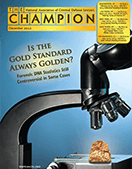December 2012

DNA evidence is typically accompanied by impressive statistics so why are DNA test results sometimes unreliable? Are prosecutors disciplined when they violate the fair trial rights of defendants?
Articles in this Issue
-
A Defense in SORNA Actions (Practice Points)
The five-point argument outlined in this article has been preserved in a failure to register case under the Sex Offender Registration and Notification Act at 18 U.S.C. § 2250(a).
-
Advocates Fight for the Indigent in Tennessee (Gideon’s Champions)
When asked to think about the state of Tennessee, one’s thoughts may quickly gravitate to music. Tennessee is the birthplace of rock and roll, country and blues, and musical icons from the past and present quickly come to mind: Johnny Cash, B.B. King, Patsy Cline, Kenny Chesney, and Elvis Presley. Others may think of the state’s strong ties to the Civil Rights Movement. Tennessee was the home of the Highlander Folk School, a training ground for many of the Movement’s key figures including Rosa Parks and John Lewis, and the Lorraine Motel where Martin Luther King, Jr., was assassinated.
-
Affiliate News
Affiliate News Gerald Lippert Affiliate News December 2012 06 2013 NACDL & Affiliate CLE Calendar April 5-6 NACDL & CACJ’s 6th Annual Forensics Seminar ‘Making Sense of Science’ The Cosmopolitan Hotel, Las Vegas, Nevada Contact: NACDL’s Education Manager Akvile Athanason at 202-4
-
An Illegitimate System Of Justice Designed to Protect Secrets (Military Commissions Perspective)
The old phrases “you would have to see it to believe it,” and “you cannot make this stuff up” come to mind when thinking about the latest sessions of the Guantánamo military commissions. During the weeks of October 15 and October 22, hearings were held in the cases against the alleged 9/11 co-conspirators and the alleged USS Cole bomber before Judge Pohl in Guantánamo Bay, Cuba. The military court is closed until 2013. And, thank goodness, because after the October hearings observers’ heads are likely still spinning from the latest happenings.
-
Book Reviews: Disrobed: An Inside Look at the Life and Work of a Federal Trial Judge
Most books by federal judges are dry, weighty tomes, rarely read by practicing criminal defense lawyers except perhaps by the relatively few scholars and intellectuals among us. Rather, in my experience, most criminal defense lawyers for their leisure reading prefer books that do not tax the mind, like those of John Grisham, especially if the lead character is a courageous underdog criminal defense lawyer.
-
Book Reviews: Woman Lawyer: The Trials of Clara Foltz
In Woman Lawyer, Barbara Babcock recounts the true-life story of a pioneer woman lawyer — Clara Shortridge Foltz. At the turn of the century, Foltz was an inventor of the public defender, a crusader for suffrage, and a trial lawyer extraordinaire. Very little was known about Foltz until Babcock researched and assembled this information about Foltz’s life, career, and activism.
-
Forensic DNA Statistics: Still Controversial In Some Cases
Although forensic DNA testing is well established, experts sometimes disagree about the interpretation and statistical characterization of test results. This article will describe the key controversies and will explain what lawyers need to know to recognize and deal with controversial types of DNA evidence.
-
From the President: We Have Learned a Few Things Along the Way
Lawyers must not be afraid to learn science.
-
Henderson v. United States And the Plain Error Rule: Metaphysics, Unicorns, and Injustice (Inside NA
Imagine a criminal prosecution in which a trial judge unlawfully imposed a far longer sentence on a defendant than the law prescribed. Now image that notwithstanding the universal agreement that the sentence was improperly enhanced, the defendant cannot obtain relief from the courts.
-
Independent Juries: Liberty’s Last Defense
There is no dispute that American jurors have the right and responsibility of judging the facts in a criminal trial. But what about the law? Should they also be allowed to judge a law or societal practice that they believe to be unjust by returning a not guilty verdict when, perhaps, all of the elements of a crime have been proven?
-
Informal Opinion: U.S. v. Daugerdas: A Cautionary Tale About Investigating Jurors
Despite the obvious benefits to the attorney, there are some real perils associated with investigating or researching prospective jurors
-
NACDL News: DOJ and SEC Issue Nonbinding ‘Guidance’ on FCPA Enforcement
NACDL News: DOJ and SEC Issue Nonbinding ‘Guidance’ on FCPA Enforcement Ivan J. Dominguez NACDL News December 2012 7 The U.S. Department of Justice (DOJ) and Securities and Exchange Commission (SEC) issued long-expected guidance concerning the enforcement of the Foreign Corrupt Practices Act (FCPA
-
NACDL News: NACDL Member Sheryl Gordon McCloud Elected to Supreme Court of Washington State
NACDL News: NACDL Member Sheryl Gordon McCloud Elected to Supreme Court of Washington State Ivan J. Dominguez NACDL News December 2012 07 Washington appellate attorney Sheryl Gordon McCloud was elected on Nov. 6, 2012, to a six-year term on the Supreme Court of the State of Washington. Ms. Gordon M
-
NACDL News: Warrant for Content Requirement For Email, and Then It Disappears
NACDL News: Warrant for Content Requirement For Email, and Then It Disappears Ivan J. Dominguez NACDL News December 2012 07 On Nov. 29, 2012, the U.S. Senate Judiciary Committee adopted legislation (H.R. 2471) containing Sen. Patrick Leahy’s undiluted amendment requiring a warrant for law enforcem
-
Taking Prosecutorial Misconduct ‘Unseriously’: Brady Violations and The Myth of Professional Account
Prosecutors have complete or absolute immunity from suit for their actions, even when taken in bad faith, in the course of carrying out their function of litigating criminal cases. In justifying this rule, which it adopted in Imbler v. Pachtman1 and expanded upon in subsequent cases,2 the Supreme Court has assumed that the threat of professional discipline would deter prosecutors from violating the obligations of their office.
